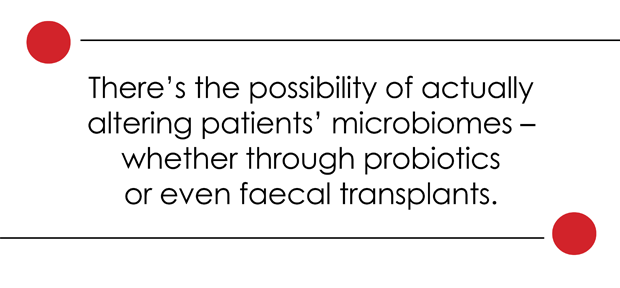New research shows thousands of people with stage 4 cancer in England are living for two years or more.
Daily Archives: 07/11/2017
SMART: Facial recognition for molecular structures
[unable to retrieve full-text content]

New model reveals possibility of pumping antibiotics into bacteria
[unable to retrieve full-text content]

It takes a microclimate to raise a pinyon tree
[unable to retrieve full-text content]

Health24.com | SEE: This is how noise can affect your health
Hearing Expert
AuD degree obtained in 2013 at AT Still University Health Science Depart-ment, Arizona. Masters in Communication Pathology at the University of Pretoria, 2003. Remedial Teaching Diploma at Rand University, 1996. Degree in Speech-Language Pathology and Audiology at the University of Pretoria, 1993. Owner of a private practice in Pretoria since 1999. Educating the community regarding early identification of hearing problems and screening of new-borns. Providing assistance and services at retirement homes. Part-time lecturer at the University of Pretoria and the University of Limpopo. External examiner at the University of Pretoria and the University of Limpopo. Presenter at conferences and seminars.

Norfolk and Norwich Hospital creates A&E for elderly patients
A hospital’s plans to create an emergency department for the elderly is welcomed by Age UK.
‘UK wellbeing rises after Brexit vote’
There have been small but significant improvements in people’s happiness in the last year, say UK officials.
Health24.com | What is the link between gut bacteria and cancer treatment?
The type of bacteria that cancer patients harbour in the gut might affect their odds of responding to certain treatments, two early studies hint.
These trillions of bacteria and other microbes that live in the human intestines are referred to as the “microbiome”.
The research, in humans and mice, adds to evidence that gut bacteria play a key role in the immune system.
Freeing up the immune system
Both studies looked at whether there’s a link between patients’ gut bacteria and their responses to newer cancer drugs called PD-1 inhibitors. The drugs, which include Keytruda (pembrolizumab) and Opdivo (nivolumab), work by freeing up the immune system to attack cancer cells.
The drugs are approved for several cancers, including advanced cases of melanoma, lung, bladder and stomach cancers.
In one study, researchers focused on 112 patients with advanced melanoma, the deadliest form of skin cancer. The investigators found that those who’d responded to PD-1 therapy tended to have a gut “microbiome” that was distinct from those of patients who did not respond.
The new research appears in Science.
Those who’d responded generally had more diversity in their bacteria, plus higher concentrations of common bacteria called Ruminococcus and Faecalibacterium.
Still, the researchers said the findings do not prove that those bacteria improve the odds of doing well on PD-1 therapy, and stressed that it’s too soon to make recommendations to cancer patients – including whether they should take “probiotic” supplements.
Diversity of gut bacteria
“Only a clinical trial can show that. This needs to be tested,” said senior researcher Dr Jennifer Wargo, an associate professor at University of Texas M.D. Anderson Cancer Center in Houston.
However, the findings build on evidence of a “clear link between the gut microbiome and immune function,” she said.
Studies have found that the diversity of those bugs – particularly in the gut – is linked to the risks of various health conditions, including those related to immune function.
According to a previous Health24 article, analysing the composition of people’s collection of gut bacteria can also help improve identification of those who are at risk for, or already have, colon cancer.
In general, studies have found, the more diversity in the gut microbiome, the better.
Wargo’s study involved a group of melanoma patients who’d responded to a PD-1 inhibitor – meaning their cancer had stabilised or regressed for at least six months – and a group that did not respond.
Gut bacteria transplanted
Overall, the responders showed an “abundance” of Ruminococcus and Faecalibacterium. In contrast, the non-responders had a high concentration of Bacteroidales bacteria.
To test whether the microbes might have a direct influence on treatment response, the researchers transplanted gut bacteria from the patients into lab mice.
Those animals also responded better to PD-1 therapy, versus mice that had transplants from non-responding patients, according to the report.
In the second study, French researchers focused on 249 patients treated with a PD-1 inhibitor for lung, kidney or urinary tract cancers. Just over one-quarter had taken antibiotics to treat an infection shortly before or after starting PD-1 treatment. (Antibiotics are drugs that kill bacteria).
Overall, those antibiotic patients had lower survival odds. Plus, 69% of patients who responded to PD-1 treatment had detectable amounts of bacteria called Akkermansia muciniphila, versus 34% of patients who did not respond.
It all raises “exciting possibilities,” Wargo said. Namely, could manipulating the gut microbiome improve the chances of responding to cancer treatment?
But there are plenty of unanswered questions. For one, “We don’t really know what constitutes a ‘favourable’ microbiome,” Wargo noted. So there is no way to tell cancer patients whether any probiotic might benefit them.
Tailoring treatment
In fact, she said, if patients were to take a random supplement, it might end up causing harm. In addition, there also needs to be more research into gut bacteria and responses to other cancer therapies, Wargo added.
Dr Nikhil Khushalani specialises in treating skin cancer at Moffitt Cancer Center, in Tampa, Florida. He cautioned that the study findings are a “first step”, but also a “very intriguing” one.
Khushalani said the findings raise the possibility of testing patients’ stool samples to see who has a greater likelihood of responding to PD-1 therapy. “That could help us in truly tailoring treatment,” he suggested.
Then there’s the possibility of actually altering patients’ microbiomes – whether through probiotics or even faecal transplants, Khushalani added.
Like Wargo, he cautioned patients against self-treating with probiotics, given the unknowns.
“But that could be where we’re heading,” Khushalani said. “Hopefully, this will open the door to even more research in this arena.”
Image credit: iStock

Health24.com | 7 tips to manage your anxiety
A little bit of stress can motivate you, but too much might cause an anxiety disorder that can prevent you from living your life to the fullest.
Anxiety disorders are often misunderstood – many people think that you can simply overcome the symptoms by willpower. While it’s important to seek professional treatment, it’s also important to adapt your lifestyle.
If you feel anxious on a daily basis, try making changes to your lifestyle to manage anxiety on your own.
1. Move more
Exercise regularly to release the body’s endorphins, our natural feel-good chemicals. Set a goal of 30 minutes at least five days of the week.

2. Get decent shuteye
Be sure to get enough sleep, typically between seven and eight hours every night.

3. Keep a clear mind
During waking hours, take short breaks from whatever stresses you out – meditation and listening to music are great ways to clear your head.

4. Adapt your diet
Eat healthy and don’t skip meals. Limit alcohol and caffeine, which can worsen anxiety and trigger panic attacks.

5. Seek help
If adjustments to your routine don’t lessen your anxiety, talk to your doctor, especially if anxiety or depression runs in your family. You could have an anxiety disorder.

6. Monitor your feelings
Keep a symptom diary and be on alert for the warning signs of an anxiety disorder.
Possible anxiety disorder symptoms include:
- Constant worry
- Avoiding social situations
- Panic attacks
- Nightmares

7. Find the best treatment for you
If you’re diagnosed with an anxiety disorder, stay positive. There are many treatments available, such as cognitive behavioural therapy to help you change your thought patterns. Also, there are other types of therapy, medication, and simple adjustments to your daily routine.
Most important is finding a therapist you’re comfortable working with and who’s experienced in treating anxiety disorders.

Image credits: iStock
NEXT ON HEALTH24X





